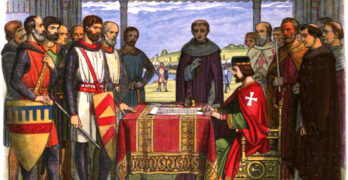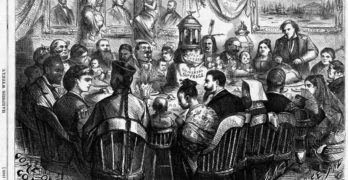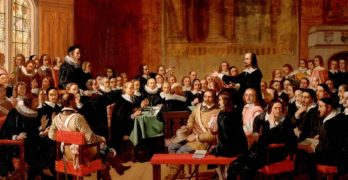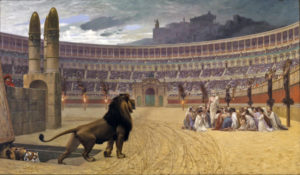 The Bible is the Word of God, and Christ is the Word of God. The Bible perfectly reveals Christ; Christ perfectly fulfills the Bible. The Bible is the written Word of God; Christ is the personal Word of God. Before His incarnation Christ was the eternal Word with the Father. In His incarnation Christ is the Word made flesh. The same Holy Spirit that reveals God through His written Word also reveals God in the Word made flesh, Jesus of Nazareth. All the sermons in Acts were about a Man Jesus Christ.
The Bible is the Word of God, and Christ is the Word of God. The Bible perfectly reveals Christ; Christ perfectly fulfills the Bible. The Bible is the written Word of God; Christ is the personal Word of God. Before His incarnation Christ was the eternal Word with the Father. In His incarnation Christ is the Word made flesh. The same Holy Spirit that reveals God through His written Word also reveals God in the Word made flesh, Jesus of Nazareth. All the sermons in Acts were about a Man Jesus Christ.
Christ is the Word of God
The Apostles preached Jesus Christ. They preached His death, burial, and resurrection and especially emphasized His resurrection as proof that He was God in the flesh. Throughout its pages the Bible declares itself to be the “Word of God.” On the other hand, in a number of passages the same title –“the Word” or “the Word of God”—is given to Jesus Christ Himself For example:
In the beginning was the Word, and the Word was God, and the Word was God (John 1:1) And the Word (Christ) became flesh (human, incarnate) and tabernacle (fixed His tent of flesh, lived awhile) among us; and we [actually] saw His glory ( His honor, His majesty), such glory as an only begotten son receives from his father, full of grace (favor, loving-kindness) and truth.” (John 1:14 AMP)
He (Christ) is dressed in a robe dyed by dipping in blood, and the title by which He is called is The Word of God. (Revelation 9:13)
Jesus’ life is a testimony to His belief in the divine authority of the Scriptures. At the age of 12 He confounded the spiritual leaders of Israel with His knowledge of God’s Word (Luke 2:41-51)
Jesus said “You search and investigate and pore over the Scriptures diligently, because you suppose and trust that you have eternal life through them. And these [very Scriptures] testify about Me!” (John 5:39 AMP) Most importantly, Jesus affirmed the Scriptures as the inspired Word of God. On one occasion as Jesus was teaching, a certain woman in the crowd raised her voice and said to Him:
Blessed (happy and to be envied) is the womb that bore You and the breasts that You sucked! But He said, Blessed (happy and to be envied) rather are those who hear the Word and obey and practice it!” (Luke 11:27-28 AMP).
Jesus used Scripture to teach the fundamentals of kingdom living (Matthew 5-7) He used Scripture to confront and confound Satan (Matthew 4:1-11; Luke 4:1-13). He used Scripture to teach His disciples after His resurrection and to open their minds to understand the Scriptures “Then beginning with Moses and [throughout] all the Prophets, He went on explaining and interpreting to them in all the Scriptures the things concerning and referring to Himself. (Luke 24:27, 44-45)
Jesus quoted Moses, the Psalms, and the prophets. The disciples of Jesus evidenced the same respect for the Scriptures. The Gospel of Matthew quotes Old Testament passages repeatedly from beginning to end, attempting to prove to Jewish readers that Jesus fulfilled messianic prophecy.
Paul said: Every Scripture is God breathed (given by His inspiration) and profitable for instruction, for reproof and conviction of sin, for correction of error and discipline in obedience, [and] for training in righteousness (in holy living, in conformity to God’s will in thought, purpose, and action), So that the man of God may be complete and proficient, well fitted and thoroughly equipped for every good work (2 Timothy 3:16-17 AMP).
In His Sermon on the Mount, delivered early in His ministry, Jesus affirmed that He had come to fulfill the Scriptures. He said that heaven and earth would pass away before one jot would pass away—thereby affirming the verbal inspiration of the Scriptures.
At the end of His ministry, in the last prayer He prayed with His disciples, Jesus referred to the Scriptures as the Word of God and then added, “Thy word is truth.” (John 17: 14-17) At one point Nicodemus confronted the Pharisees with their failure to keep their own laws. The temple guards came back impressed by Jesus, and one of the Pharisees–Nicodemus was defending Him.
When the temple guards returned without having arrested Jesus, the leading priests and Pharisees demanded,”Why didn’t you bring Him in?” “We have never heard anyone speak like this!” the guards responded……Then Nicodemus, who came to Jesus before at night and was one of them, asked, Does our Law convict a man without giving him a hearing and finding out what he has done? They answered him, Are you too from Galilee? Search the Scriptures yourself, and you will see that no prophet comes (will rise to prominence) from Galilee” (John 7: 45-52).
Yet God had fulfilled this through Isaiah when he clearly predicted in Scripture: Nevertheless, that time of darkness and despair will not go on forever. In the land of Zebulum and of Naphtali, beside the sea, beyond the Jordan River, in Galilee where so many Gentiles live, the people who sat in darkness have seen a great light. And for those who lived in the land where death casts its shadow, a light has shined”(Isaiah 9:1-3 NLT).
Divinely inspired Word of God
The Bible itself claims to be divinely inspired. More than 3,000 times the biblical writers claim to be speaking the words of God. Over and over, the writers say, “Thus says the Lord,” or “The Lord said.” These are the common phrases in the Bible. The writers also repeatedly refer to the Scriptures as “the Word of God” (1 Sam. 9:27 and Acts 6:2), and they affirm that it is inspired by God (see 2 Timothy 3:16).
Peter writes: Yet first you must understand this, that no prophecy of Scripture is a matter of any personal or private or special interpretation (loosening, solving). For no prophecy ever originated because some man willed it to do so it never came by human impulse, but men spoke from God who were borne along (moved and impelled) by the Holy Spirit” (2 Peter 2:20-21). The apostle John asserted that the one who loves the Lord is the one who “keeps His Word” (1 John 2:5)
The Holy Spirit Teaches Word.
The Scriptures are not hard to understand if we rely on the Holy Spirit who is the teacher and revealer of His Word. The Word of God alone is our standard of judgment in spiritual things. This Word can only be explained by the Holy Spirit and that today as well in former times, He is the teacher of His people.
The Scriptures were not written for intellectuals and one doesn’t have to have a PhD to understand what the Holy Spirit is saying through the apostles and prophets. The Scriptures were written for the common person.
The Scriptures were written to convict people of sin and draw them to salvation in Jesus. It is God’s Word alone-as we hear and do it, as we study and apply it—that is able to build up within us a strong, secure edifice of faith, laid upon the foundation of Christ Himself.
Library of many Books
The reason why we use the Bible to interpret the Bible is because it is not one Book. It is a collection of 66 books written by more than 40 authors over a period of 1,600 years. The Bible is a whole library of many kinds of books. God arranged the Bible so that we could read one book at a time. David Pawson a widely respected Bible teacher tells us:
God gave us His Word in books, but not in chapters and verses. That was the work of two bishops, French and Irish, centuries later. It became easier to find a text and ignore context.
The authors of these 66 books came from every walk of life, kings, peasants, philosophers, fishermen, poets, statesmen, scholars, tax collectors, farmers, and medical doctors. They wrote in every conceivable place—palaces, dungeons, on islands, in the wilderness, in cities, and in the midst of wars. They wrote in different moods, ranging from heights of ecstasy to the depths of despair and sorrow.
They spoke on hundreds of controversial subjects. They wrote in three different languages. They utilized every conceivable literary style—history, law, poetry, biography, memoirs, letters, sermons, drama, parables, prophecy—you name it! Yet, despite all their diversity, their writings interlock with a harmony and continuity from Genesis to Revelation that can only be explained by pointing to Divine inspiration.
Conclusion
The Bible is God’s truth about Himself. God uses this Word to draw us into a deep, personal relationship with Him. The Bible tells us how we should relate to Him and it was originally given to Israelites so that they would know the Lord their God from personal experience. The Bible tells us we are all infected with a virus called sin but God provided a Lamb to rescue us from eternal destruction. Behold! The Lamb of God who takes away the sin of the world! (John 1:29).
The Bible is the authoritative Word of God, and its message has changed millions of lives throughout history. It has survived despite the numerous efforts of so many to destroy it. The permanence of God’s Word was attested by Isaiah when he wrote, “The grass withers, the flower fades, but the Word of our God stands forever” (Isaiah 40:8).
The existence of numerous specific sites that are referenced in the Gospels have been confirmed by archaeologists. Based on the very methods that literary and historical scholars use today, the only reasonable and logical conclusion that we can draw is that the Bible is the most reliable book of antiquity.
Charles H. Spurgeon, the preacher from London, was invited to come and give a series of 10 lectures in defence of the Bible. He wired back, “I will not come, the Bible needs no defense.” Turn it loose, and like a lion, it will defend itself.” I believe that, and I believe the Word of God needs no defense. We only need to preach it.


















































